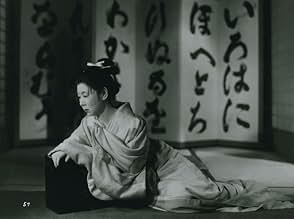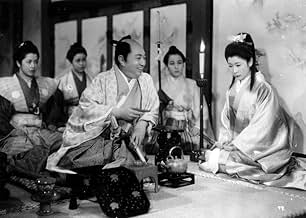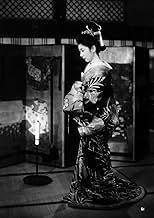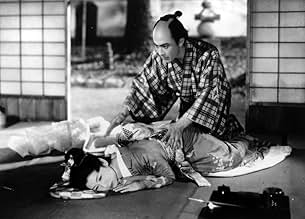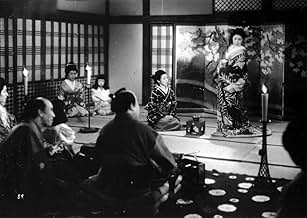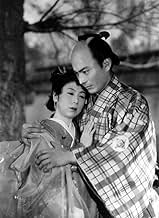CALIFICACIÓN DE IMDb
8.1/10
8 k
TU CALIFICACIÓN
La lucha de una mujer y su supervivencia en medio de las vicisitudes de la vida y la crueldad de la sociedad.La lucha de una mujer y su supervivencia en medio de las vicisitudes de la vida y la crueldad de la sociedad.La lucha de una mujer y su supervivencia en medio de las vicisitudes de la vida y la crueldad de la sociedad.
- Dirección
- Guionistas
- Elenco
- Premios
- 2 premios ganados y 1 nominación en total
Akira Oizumi
- Manager Bunkichi
- (as Hiroshi Oizumi)
- Dirección
- Guionistas
- Todo el elenco y el equipo
- Producción, taquilla y más en IMDbPro
Opiniones destacadas
a fifty-year old prostitute in Japan has to live in poverty, because no man is interested in her services. She visits a temple and one of the statues resembles the young Samurai, with whom her decline began. Being a noble's daughter she was not allowed to marry him, he was executed and she and her family were expelled from the court. Thereafter one misfortune follows the other. All of her attempts to lead an honest and happy life fail. The film is set in beautiful Japanese landscape and architecture, in which the action of the is arranged with great care. You can feel the inhuman rigor of feudal society and court etiquette. Nevertheless, the aesthetic quality if the films is slightly lower than those of Ozu's and Kurosawa's films. A highly recommendable movie though(8).
'The Life of Oharu' is not an easy film to watch. There is barely even a fleeting moment of joy/happiness and towards the end, the viewer will find himself/herself getting really angry and outraged by the unthinkable oppression and atrocities and engulf our titular protagonist. Mizoguchi's sympathetic treatment of Oharu compels the viewer to feel beaten down and horrified by Oharu's miserable plight.
The long line of tragedies in Oharu's life gets triggered by her decision to fall in love with Katsunosuke(played by the legendary Toshirô Mifune), a man of lower social standing. This element of forbidden love was also present in the previous Mizoguchi film that I watched namely 'The Story of Last Chrysanthemum'. The story arc of Otoku in that film to a some extent resembles the arc of Oharu in this one in terms of the mental and physical torture that they are both subjected to. Oharu makes an effort to conform to society's deplorable expectations, but even then gets nothing to show for it and gets discarded. This is because once she falls in social standing and gets sold off by her family, she ceases to be a human being in the eyes of society. There is a lot of references to trade and business in 'The Life of Oharu' which is relevant because Oharu over the course of her life becomes nothing more than a commodity to be sold from one customer to the next in the patriarchal society of 17th century Japan.
Mizoguchi technical mastery is again on show in 'The Life of Oharu'. Some of the long takes and extended tracking shots are truly remarkable. Mizoguchi had the ability to suggest a plethora of things like passage of time, a change in mood, etc. with one little pan movement of the camera or with just the camera placement and those features are on show here too. The interior sets are beautifully designed and the haunting music by Ichirō Saitō is used craftily from time to time to set/change the mood. Kinuyo Tanaka has to be admired for lending the sympathy inducing tender innocence to Oharu. Her performance in the scenes depicting the later stages of Oharu's life is jaw-dropping in its authenticity and humanity.
To conclude, I have to reiterate that 'The Life of Oharu' is not for everyone. One has to be in a specific mood to be able to endure the emotionally crushing narrative and storytelling of the film. But having said that, I still believe that it needs to be watched as Oharu represents numerous women(of Japan and beyond) in history and present times whose lives were and are still getting destroyed due to an oppressive society which denigrates women. It is said that Mizoguchi's obsession with capturing the misery of women in the face of oppression had its roots in his own childhood as his own sister who raised him was sold by their father. One can sense a personal grief, a personal intimacy in the style of storytelling in this particular film. Highly Recommended.
The long line of tragedies in Oharu's life gets triggered by her decision to fall in love with Katsunosuke(played by the legendary Toshirô Mifune), a man of lower social standing. This element of forbidden love was also present in the previous Mizoguchi film that I watched namely 'The Story of Last Chrysanthemum'. The story arc of Otoku in that film to a some extent resembles the arc of Oharu in this one in terms of the mental and physical torture that they are both subjected to. Oharu makes an effort to conform to society's deplorable expectations, but even then gets nothing to show for it and gets discarded. This is because once she falls in social standing and gets sold off by her family, she ceases to be a human being in the eyes of society. There is a lot of references to trade and business in 'The Life of Oharu' which is relevant because Oharu over the course of her life becomes nothing more than a commodity to be sold from one customer to the next in the patriarchal society of 17th century Japan.
Mizoguchi technical mastery is again on show in 'The Life of Oharu'. Some of the long takes and extended tracking shots are truly remarkable. Mizoguchi had the ability to suggest a plethora of things like passage of time, a change in mood, etc. with one little pan movement of the camera or with just the camera placement and those features are on show here too. The interior sets are beautifully designed and the haunting music by Ichirō Saitō is used craftily from time to time to set/change the mood. Kinuyo Tanaka has to be admired for lending the sympathy inducing tender innocence to Oharu. Her performance in the scenes depicting the later stages of Oharu's life is jaw-dropping in its authenticity and humanity.
To conclude, I have to reiterate that 'The Life of Oharu' is not for everyone. One has to be in a specific mood to be able to endure the emotionally crushing narrative and storytelling of the film. But having said that, I still believe that it needs to be watched as Oharu represents numerous women(of Japan and beyond) in history and present times whose lives were and are still getting destroyed due to an oppressive society which denigrates women. It is said that Mizoguchi's obsession with capturing the misery of women in the face of oppression had its roots in his own childhood as his own sister who raised him was sold by their father. One can sense a personal grief, a personal intimacy in the style of storytelling in this particular film. Highly Recommended.
Mizoguchi's empathy for female characters is legendary. The Life of Oharu is one outstanding example. One woman's journey from member of the imperial court to elderly streetwalker is narrated in exquisite, shimmering, painful style. Oharu (Kinuyo Tanaka) is seduced by a man below her station. Her crime is to love the man back unreservedly. That action becomes the catalyst for a series of degradations punctuated by false dawns, as Oharu's life spirals to rock bottom. And as bleak and depressing as that sounds, Mizoguchi's storytelling, combined with Tanaka's dignified portrayal, make this film cathartic, a tragedy with a small, life-affirming message at its heart. It is a cautionary tale to the follies of social mores, and the burden that women through the ages have to endure. More than that, it is a tale of one woman's dignity through the most humiliating of circumstances. Stunning.
Deeply tragic and sad tale that is nevertheless presented to us with great dignity and style. A tale of the harshness of feudal Japan and the way the men treat the women is unfortunately not without its echo, even today in that great country. A woman here, originally of noble beginnings, makes bad, then good, then more and more bad and none of it of her making. She is simply the result in men's dealings and hypocrisies. Still beautiful to look at though with the magical camera-work and immaculate direction. Some slight confusions at first until we realise that time jumps at the blink of an eye and before we know it one period has slid effortlessly into another, where inevitably another tragedy awaits our fallen heroine.
As this film opens, Oharu (Kinuyo Tanaka), a 50 year old prostitute, goes into a Buddhist temple and looks back at her life. We see that she was once loved, but because her young suitor (the great Toshiro Mifune) was of a lower caste, it was forbidden, resulting in her being banished and him being beheaded. As her family has been shamed, her father jumps on the chance to send her to a local Lord who is looking for a mistress who can be a surrogate mother. Unfortunately, she's abruptly dismissed after bearing him a son, and from there she steadily declines. The film was highly personal to director Kenji Mizoguchi since his own sister (who had raised him) was sold by their father to be a geisha, which is one of the things that happens to Oharu.
Like 'Ugetsu', the film Mizoguchi made the following year, 'The Life of Oharu' is a morality tale, and while it's less heavy-handed than 'Ugetsu', it is fairly melodramatic. The central message is one of Buddhist compassion, and not just for those who we know have had a sad, unfair life – but also those who appear derelict or decrepit to us, and who we might otherwise judge, not knowing what they've experienced. While there is depth to that message, and it's certainly nice seeing a film that empathizes with woman and the misogyny they endure, 'The Life of Oharu' is dark and hard to watch for 148 minutes. The plot is quite linear and we see her used and abused in every single societal role she plays: daughter, lover, concubine, courtesan, wife, nun, and common prostitute. I also don't think Tanaka was well utilized in this role – she simply doesn't look young enough in early scenes, or old enough in later scenes. The filmmaking is good and the film has a solid place in film history for its message, but it's too bleak, and too simplistically so, for a film of this length.
Like 'Ugetsu', the film Mizoguchi made the following year, 'The Life of Oharu' is a morality tale, and while it's less heavy-handed than 'Ugetsu', it is fairly melodramatic. The central message is one of Buddhist compassion, and not just for those who we know have had a sad, unfair life – but also those who appear derelict or decrepit to us, and who we might otherwise judge, not knowing what they've experienced. While there is depth to that message, and it's certainly nice seeing a film that empathizes with woman and the misogyny they endure, 'The Life of Oharu' is dark and hard to watch for 148 minutes. The plot is quite linear and we see her used and abused in every single societal role she plays: daughter, lover, concubine, courtesan, wife, nun, and common prostitute. I also don't think Tanaka was well utilized in this role – she simply doesn't look young enough in early scenes, or old enough in later scenes. The filmmaking is good and the film has a solid place in film history for its message, but it's too bleak, and too simplistically so, for a film of this length.
¿Sabías que…?
- TriviaThis film, which was director Kenji Mizoguchi's dream project, was severely under-financed, and the production was forced to use a warehouse instead of a regular sound stage. This warehouse happened to be located near railways, and each time a train passed by, they had to stop shooting, which made the shooting of the film even more difficult with the director's obsessive use of long, continuous, uninterrupted takes. The same warehouse was also used for Josef Von Sternberg's film 'The Saga of Anatahan'.
- Citas
Katsunosuke: Lady Oharu, a human being - no, woman - can only be happy if she marries for love. Rank and money don't mean happiness.
- Créditos curiososOpening credits shown over Japanese artwork/water-colors.
- ConexionesFeatured in Écoute voir... (1978)
Selecciones populares
Inicia sesión para calificar y agrega a la lista de videos para obtener recomendaciones personalizadas
- How long is The Life of Oharu?Con tecnología de Alexa
Detalles
Taquilla
- Total a nivel mundial
- USD 6,921
- Tiempo de ejecución2 horas 28 minutos
- Color
- Mezcla de sonido
- Relación de aspecto
- 1.37 : 1
Contribuir a esta página
Sugiere una edición o agrega el contenido que falta

Principales brechas de datos
By what name was La vida de Oharu, mujer galante (1952) officially released in India in English?
Responda
